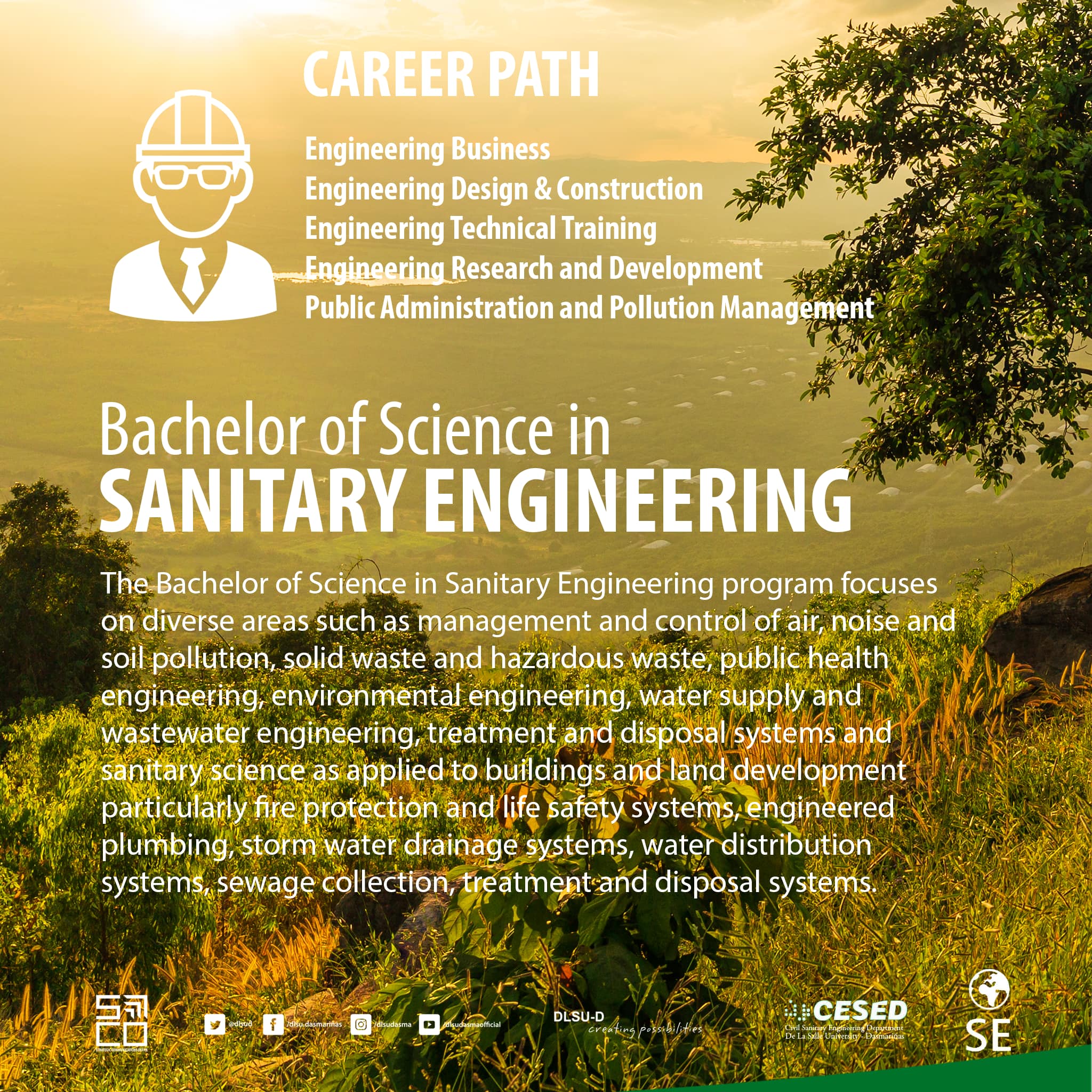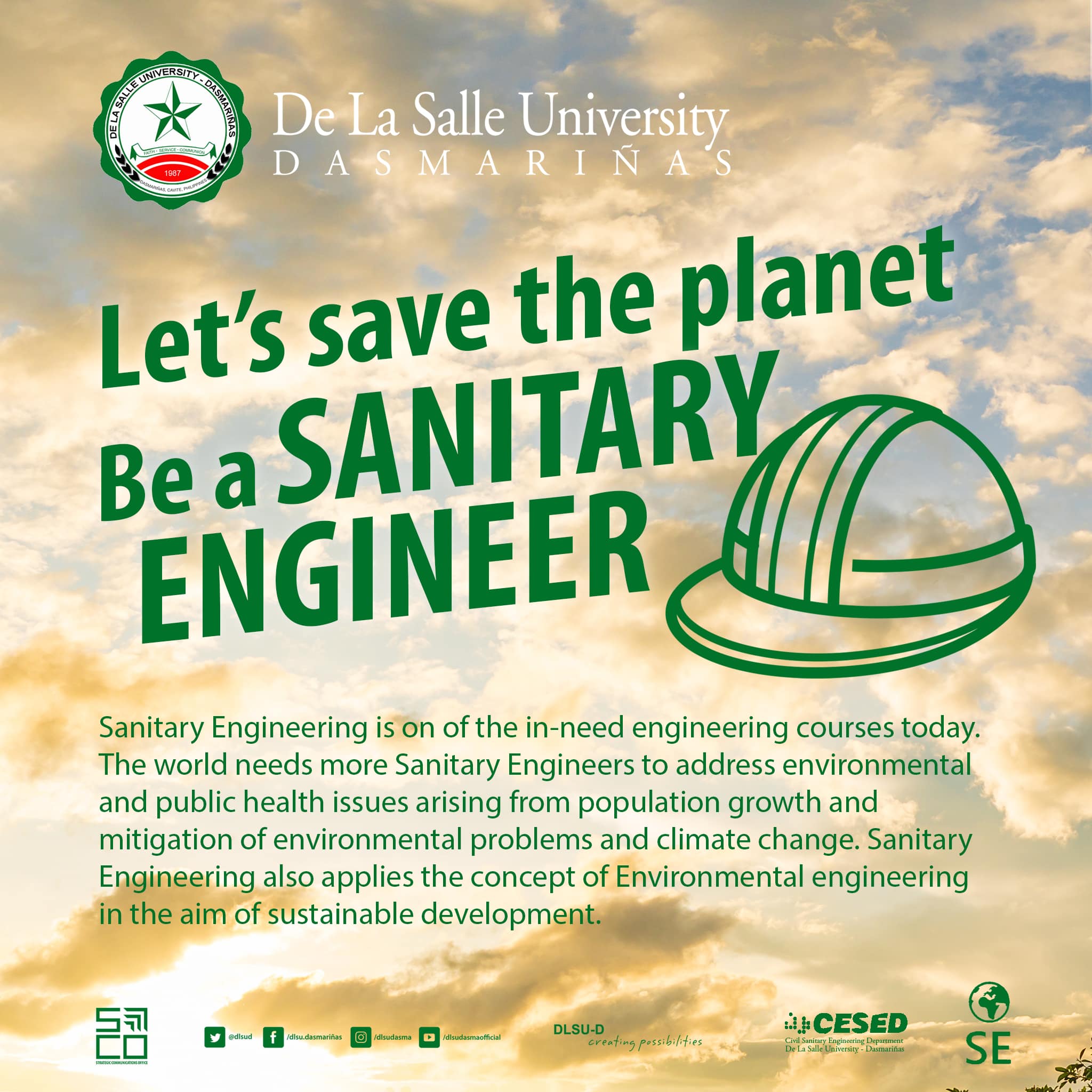The Bachelor of Science in Sanitary Engineering program focuses on diverse areas such as noise, air, and solid waste pollution control, public health engineering, mass and energy transport, fluid mechanics, and water resource engineering.
Bachelor of Science in Sanitary Engineering
Program Educational Objectives
The Sanitary Engineering program shall produce professionals who:
- practice his/her profession in his/her capacity as a registered sanitary engineer.
- promote advocacies and other endeavors supported by his/her acquired sanitary engineering education.
- enhance his/her knowledge and skills via professional advancement in a specialized field of expertise.
- exhibit professional ethics and attitude in engineering practice.
- demonstrate substantial involvement in projects related to key areas in public health engineering, environmental engineering, water and waste water engineering, ecology, pollution and control.
Program Outcomes
By the time of graduation, the students of the program shall be able to:
- acquire proficiency in Mathematics, Physics, General Chemistry, Social Science, Microbiology and Toxicology and Fluid Mechanics.
- understand introductory Level knowledge of Sanitary Engineering issues associated with air, land and water systems and associated environmental health impacts.
- conduct laboratory experiments and critically analyze and interpret data in any one or more than one major Sanitary Engineering focus areas e.g. air, water, land, environmental health.
- perform engineering designs by means of design experiences integrated throughout the professional component of the curriculum.
- acquire principles and practice relevant to the Sanitary Engineering programs objectives.
- use advance concepts of professional practice and the roles and responsibilities of the various stakeholders pertaining to Sanitary Engineering.
- function within a multi-disciplinary team.
- communicate effectively.
- to understand contemporary issues.
- recognize of the need for, and an ability to engage in lifelong learning.
- understand the impact of engineering solutions in global, economic, environmental and societal context.
First Year
- English in a Lasallian Context
- Math in the Modern World
- Calculus 1 for Engineers
- Chemistry for Engineers Lec
- Chemistry for Engineers Lab
- Applied Engineering Mathematics
- Sanitary Engineering Orientation
- Engineering Drawing 1
- Understanding the Self
- Our Christian Faith and Lasallian Identity
- Physical Fitness & Self-Testing Activities
- Towards One Goal: Social Transformation
- The Authentic Lasallian Learner
- English for Purposive Communication
- Data Analysis for Engineering
- Calculus 2 for Engineers
- Physics for Engineers Lec
- Physics for Engineers Lab
- Applied Engineering Science
- Science, Technology, and Society
- Computer Fundamentals and Programming for Engineers Lab
- Christian Discipleship in the Modern World
- Individual/Dual Sports
- Community Service by Focus Programs: Health, Education, Livelihood, Pastoral and Self-Governance (HELPS)
Second Year
- Diskurso sa Filipino
- Differential Equations
- Statics of Rigid Bodies
- Elementary and Higher Surveying Lec.
- Elementary and Higher Surveying Field Work
- Environmental Science and Engineering
- Environmental Chemistry Lecture
- Environmental Chemistry Laboratory
- Computer Aided Design
- Christian Commitment in Contemporary Society
- Swimming
- Classic Literatures of the World
- Art Appreciation
- Ethics
- Advanced Mathematics for SE
- Dynamics of Rigid Bodies
- Mechanics of Deformable Bodies
- Construction Materials & Testing Lec.
- Construction Materials & Testing Lab.
- Microbiology and Parasitology for Environmental Engineers-Lec.
- Microbiology and Parasitology for Environmental Engineers-Lab.
- The Catholic Social Teaching and Our Social Responsibility
- Team Sports
Third Year
- Technical Writing
- Literatures of the World and its Effect to Development
- Pagsasaling Teknikal sa Larangang Akademiko
- The Contemporary World
- Structural Theory 1 Lecture
- Structural Theory 1 Laboratory
- Fluid Mechanics Lecture
- Fluid Mechanics Laboratory
- Numerical Solutions to SE Problems Lec.
- Numerical Solutions to SE Problems Lab.
- Geology
- Engineering Economics
- Safety Management
- Mga Babasahin Hinggil sa Kasaysayan ng Pilipinas
- Hydraulics Lecture
- Hydraulics Laboratory
- Hydrology
- Principles of Reinforced/Prestressed Concrete Lecture
- Principles of Reinforced/Prestressed Concrete Laboratory
- Engineering Utilities 1 (Basic EE)
- Public Health Engineering
- Occupational Health and Safety
- Engineering Management
- Engineering Utilities 2 (Basic ME)
Fourth Year
- Technopreneurship
- Geotechnical Engineering 1 Lec
- Geotechnical Engineering 1 Lab
- Environmental Planning, Laws, and Impact Assessment
- Sanitary Science, Fire Protection and Plumbing as applied to bldgs.
- Sanitary Science, Fire Protection and Plumbing as applied to bldgs.
- SE Project 1 Lec ( Research Method)
- SE Project 1 Lab ( Research Method)
- SE Correlation Course 1
- Water Supply Planning and Development
- Sewerage and Urban Planning
- SE Laws, Ethics and Contracts
- SE Project 2 Lec.(Thesis)
- SE Project 2 Lab. (Thesis)
- Environmental Engineering Lab.
- Water Purification Process Design
- Sewage and Industrial
- Wastewater Treatment
- Solid and Hazardous
- Waste Engineering
- SE Field Practice / OJT (240 hours)
- SE Correlation Course 2
- SE Field Trips & Seminars
- Construction Methods and Project Management
- Construction Methods and Project Management
- Kursong Rizal
Non STEM track are required to take bridging courses for Mathematics and Science
- Bridging Courses in Science
- Bridging Courses in Mathematics
College Freshmen
- An applicant who has completed Senior High School and has not taken any college course, or
- An applicant who has completed equivalent Secondary Education from any school abroad and has not taken any college course, or
- A passer of Alternative Learning System (ALS) with certification of eligibility to be admitted to college.
College Transferee
- An applicant who has taken college programs or units not more than 75% of his/her curriculum in other CHED recognized colleges or universities, or
- An applicant who has taken college programs or units not more than 75% of his/her curriculum in colleges or universities abroad, OR
- An applicant who has taken vocational or any special training in recognized colleges or universities abroad, OR
- An applicant who has officially enrolled in any degree or certificate programs after High School.
Second Course Taker
- An applicant who has completed any college degree from any CHEd recognized college or university, or
- An applicant who has completed any college degree from college or university abroad.
Freshmen
The College conforms to the institutional policies for admitting freshmen. Particularly for BS Architecture, freshman applicants should pass the skills assessment interview that would be conducted by the Department Chair.
Shiftees
A student who intends to shift to any of the programs of the College should have a GPA of at least 80% (or 2.0 in the numerical grading system) and pass the interview and qualifying examination conducted by the Dean/Chair or his/her designate.
Transferees
Applicants should pass the interview conducted by the Dean of the College and the college entrance test administered by the Institutional Testing and Evaluation Office, and meet other requirements that may be set by the college. A transferee shall be placed on probation for one semester. If he/she performs well in academics and manifests satisfactory behavior, transferees would be considered "regular status" the following semester.
Standard Policy and Requirements for Shiftees and Transferees
A shiftee/transferee from other colleges and/or universities may be qualified for Admissions to any of the programs offered by the Engineering Department of the College of Engineering, Architecture and Technology provided that:
- There is an available slot.
- He is of good moral character.
- He has not taken more than 50% of the total number of units of his respective course from another college.
- He should have at least a GPA of 2.00 or its equivalent from other universities.
- He should pass the interview and the qualifying examination conducted by the respective program coordinator.
- He should pass the college entrance test administered by the Institutional Testing and Evaluation Office.
- He should be placed under the PROBATIONARY STATUS for one year. A waiver provided by the CEAT should be signed by the student and his/her guardian prior to enrollment.
Crediting of Subjects
- All major subjects taken from other universities with the same number of units and description with the program offered by CEAT will be credited provided that the university from which they have enrolled to is at least a Level 2 accredited school.
- Major subjects taken from a non-level 2 accredited schools will be credited only if the transferee passed the verifying examination given by respective program coordinator for each major subject to be credited.
Leave of Absence
- A student who could not enroll in the current semester should file a leave of absence with the Office of the College of Engineering, Architecture, and Technology. The application for LOA must be endorsed to the respective program coordinator and the Department Chair by the respective adviser.
- A student who failed to file a leave of absence will be given PROBATIONARY STATUS for one year upon his return; that is if there is still an available slot.
- Grade Point average (GPA) requirement and allowable failure
- Other grounds that may cause disqualification:
a. Commitment of major offense as stipulated in the Student Handbook
b. Three consecutive failures in any Mathematics, Science or Professional subjects
c. Accumulation of more than 24 units failing grades
d. Non-participation in the required collegiate or university activities
| First Year | Second to Third Year | Fourth Year (with only 48 academic units left before graduation) | |
| GPA Requirement (including summer term) | At least 1.50 | At least 1.25 | (immunity status) |
| Maximum Allowable Failure | One (1) subject in one semester | Two (2) subjects in one semester | (immunity status) |


